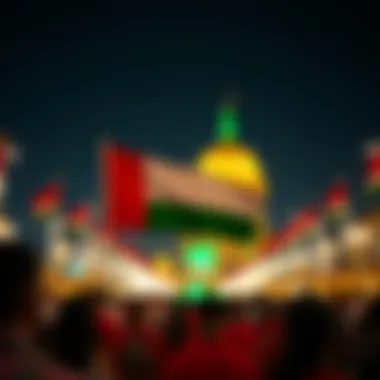UAE Holiday Calendar Insights for 2023


Intro
The United Arab Emirates (UAE) is a melting pot of diverse cultures, punctuated by its rich tapestry of holidays and observances. Understanding the 2023 holiday calendar is not only essential for those living in the UAE but also for investors and businesses navigating the vibrant real estate market in Dubai. With Islamic holidays and national events shaping daily life and commercial activities, being well-acquainted with this calendar can significantly influence property dealings and investment strategies.
As the UAE gears up for a year of celebrations, this article aims to provide a thorough exploration of the holiday calendar. Significant days will be highlighted, and insights into the cultural impact of these events and their implications for the real estate sector will be offered.
By comprehending the nuances of these holidays, stakeholders including homeowners, real estate agents, and investors can better position themselves to leverage opportunities or navigate challenges in the Gulf’s dynamic property market. With the landscape constantly evolving, let's delve into the trends that define the real estate scene in 2023!
Market Trends
Current Real Estate Landscape
The real estate market in Dubai has been a rollercoaster ride over the past few years, with fluctuations driven by a multitude of factors including economic reforms, tourism, and, crucially, public holidays. During religious observances, such as Eid or Ramadan, for instance, consumer behavior shifts significantly; many families take time off to travel or spend time together. This behavior impacts the property rental market, as certain seasons witness a spike in demand while others may see a lull. Understanding these patterns helps investors ascertain the optimal timing for property investments.
Property Price Trends
Analyzing property price trends in Dubai reveals fluctuations often coincide with the holiday calendar. For instance, the period leading up to Eid al-Fitr sees a boom in real estate activity, as expatriates and investors often seek to finalize deals or acquire properties before the holiday. Conversely, post-Eid periods might experience a slight dip in activity until the market gears up for the next seasonal changes.
Key highlights regarding property prices include:
- Peak Seasons: Anticipate increased demand at the end of Ramadan and during other holiday periods.
- Off-Peak Seasons: Typically, the months following a holiday can experience lower rental prices as people may hesitate to make decisions during holiday preparations.
As investment dynamics shift based on holidays, understanding these seasonal trends can lead to strategic advantages in the real estate landscape.
Investment Opportunities
High-Return Areas
The choice of location remains paramount in real estate investments. Areas such as Dubai Marina and Downtown Dubai frequently draw attention, particularly during and around national celebrations. These neighborhoods boast a high rate of return on investments, especially with their proximity to festivities and attractions that draw tourists and expatriates alike.
Upcoming Developments
For those looking ahead at possible lucrative investments, developments around Expo 2020, although recently concluded, focus on integrating communities and enhancing living experiences. Areas like Dubai South are making strides, potentially positioning themselves at the forefront of investment opportunities due to their planned facilities and strategic location.
To keep track of these developments, potential investors can refer to resources such as Dubai Land Department and Arabian Business, which frequently update on market trends and upcoming projects.
By being informed about holidays and developments, stakeholders in the Dubai property market can make educated decisions that not only influence their immediate investments but also contribute to long-term success. Understanding how culture interplays with the real estate sector can lead to valuable insights and informed strategies.
Preface to the UAE Holiday Calendar
The holiday calendar of the UAE serves as a reflection of the nation’s cultural, historical, and religious fabric. Knowing when these holidays fall and what they signify is essential not just for residents but also for investors and professionals engaged in the real estate market. Understanding the patterns and timings of these holidays can help individuals and organizations plan better, both socially and economically.
Understanding the Importance of Holidays
Holidays in the UAE are much more than simple days off work; they represent times of significant cultural and social importance. For many, these are periods for family gatherings, cultural celebrations, and religious observations. The significance is often deeply personal, as these occasions highlight the traditions that have been passed down through generations. Moreover, public holidays such as Eid al-Fitr and UAE National Day foster a sense of unity and cultural pride among citizens and residents alike.
Investors and businesses need to understand these holidays to align their operations with local customs, ensuring respectful engagement with the community. For example, during Ramadan, you might find reduced business hours, while celebrations on National Day may lead to increased foot traffic in retail spaces. Identifying these activities in advance allows stakeholders to optimize their strategies accordingly.
Impact on Business and Real Estate
Holidays considerably influence the economic landscape in the UAE. For real estate professionals and analysts, anticipating the timing of these holidays is crucial. The fluctuation in consumer behavior during these periods requires careful planning. Property transactions often see a surge or a drop depending on the holiday season.
- Buying Behavior: Many families prefer to move and settle into new homes around holidays to facilitate gatherings. Hence, it becomes imperative for real estate agents to be proactive during such times, positioning listings strategically.
- Investment Strategies: Knowing when to launch new projects or promotional campaigns can be beneficial. Holidays often lead to increased investment in specific sectors, making it vital to consider such factors in real estate planning.
"Understanding public holidays in the UAE is not just about marking a calendar; it’s about aligning business practices with the rhythm of the local culture."
Public Holidays in the UAE for
Public holidays in the UAE serve as touchstones for its society, reflecting the nation’s values, culture, and the blend of its historical roots with modernity. The holiday calendar of 2023 is no exception, offering a microcosm of what it means to be part of this diverse and rapidly evolving nation. These holidays provide residents and expatriates alike opportunities to celebrate, reflect, and observe traditions that transcend boundaries and foster a sense of community.


Key benefits of understanding the public holidays include:
- Planning Ahead: Knowing the holidays helps individuals and businesses to plan their activities around these days, whether it's for taking time off or for organizing events.
- Cultural Respect: For those unfamiliar with local customs, understanding holiday significance allows for better engagement with Emirati culture and traditions, which can be pivotal for those new to the region.
- Impact on Economic Activity: Public holidays can influence market dynamics, affecting everything from retail sales to real estate transactions. For investors and homeowners alike, these days often dictate the rhythm of the market.
List of Official Holidays
The official public holidays in the UAE for 2023 encompass a range of traditional and modern observances. Below are the holidays recognized across the Emirates:
- New Year’s Day (January 1)
- Eid al-Fitr (subject to moon sighting, expected on April 21 or 22)
- Arafat Day (June 27)
- Eid al-Adha (expected on June 28)
- Islamic New Year (subject to moon sighting, expected on July 19)
- Prophet Muhammad's Birthday (expected on September 27)
- Commemoration Day (November 30)
- UAE National Day (December 2)
Dates and Observances
Dates for holidays can shift slightly each year based on lunar sightings, which is particularly relevant for Islamic holidays. In 2023, public observances hinge significantly on the Islamic calendar. This means, as each holiday approaches, it’s prudent for both residents and visitors to stay updated on official announcements regarding exact dates. Along with the solemnity of some occasions, many of these holidays turn into festive celebrations, offering an insight into the rich tapestry of Emirati culture.
For instance:
- Eid al-Fitr marks the end of Ramadan, a month of fasting, symbolizing generosity, community sharing, and breaking of the fast with family and friends.
- Eid al-Adha, occurring approximately two months later, is about sacrifice and remembrance, often celebrated with communal prayers and feasts.
By familiarizing oneself with these dates and respective observances, it allows not only for personal planning but also an understanding of the collective cultural narrative that shapes life within the UAE.
Islamic Holidays in
The Islamic calendar plays a vital role in the lives of Muslims around the world, including those residing in the UAE. Understanding the key Islamic holidays not only fosters cultural appreciation but also assists businesses and real estate professionals in adjusting to seasonal changes in the market. Each holiday brings its own customs and meanings, influencing both personal and professional interactions.
Eid al-Fitr
Significance of Eid al-Fitr
Eid al-Fitr, or the Festival of Breaking the Fast, signifies the end of Ramadan, a month of fasting and reflective worship. This holiday marks a period of gratitude and community bonding. Its significance lies in both spiritual and social dimensions; it’s a time when families come together, often reconciliating long-standing differences. This unique aspect creates an environment rich in goodwill, making it a pivotal time for the real estate market. Investors and agents can leverage this by creating tailored campaigns and offerings that resonate with cultural themes of generosity and togetherness. It’s beneficial because it naturally aligns with community support, strengthening social ties and enhancing property visibility.
Traditions and Customs
Traditions on Eid al-Fitr vary, but generally include special prayers in mosques, feasting on traditional dishes, and giving zakat (charity). One remarkable feature of these customs is the exchange of gifts, fostering a spirit of sharing. These practices not only enrich communal bonds but also stir economic activity as people prepare for festivities. In terms of the real estate market, this increased consumer spending can positively affect demand for rental properties and short-term accommodations.
Eid al-Adha
Understanding Eid al-Adha
Eid al-Adha, known as the Festival of Sacrifice, commemorates the willingness of Ibrahim (Abraham) to sacrifice his son as an act of obedience to God. The holiday underscores themes of sacrifice, generosity, and gratitude. For investors, this holiday presents an opportune moment to promote properties that cater to family gatherings and events. It’s also a time when many prepare to travel, which can impact rental markets significantly. Property owners might consider offering special packages or flexible leases to attract tenants.
Celebrations and Cultural Importance
The celebrations of Eid al-Adha include communal prayers, elaborate meals, and the ritual sacrifice of livestock, typically sheep or goats. This unique feature of the sacrifice aligns with the notion of charity as families often distribute a portion of the meat to those in need. The cultural importance of Eid al-Adha cannot be overstated; it fosters communal unity and support. For real estate professionals, understanding these customs enhances their marketing strategies and strengthens their relationships with clients during this festive period.
Islamic New Year
The Islamic New Year (Hijri New Year) is a time of reflection and planning for many Muslims. It can signify opportunities for change and growth. For investors and homeowners, it is essential to note that the Islamic New Year brings renewed aspirations, which can lead to an uptick in real estate inquiries and purchases as families and individuals seek to find new homes or investments to mark the occasion.
Prophet Muhammad's Birthday
This holiday, known as Mawlid al-Nabi, celebrates the birth of the Prophet Muhammad. It’s a time for prayer and reflection, drawing communities together for religious observances and educational gatherings. During this period, many in the UAE engage in charitable acts, which may inspire a surge in community-focused initiatives and events. Real estate agents might find this period ideal for organizing community-focused events that can enhance their visibility while promoting a sense of social responsibility.
National Holidays in
National holidays in the UAE are not just days off; they carry cultural weight and foster a sense of community. These holidays are crucial for understanding social ties and the collective identity of the nation. As investors or homeowners in Dubai, recognizing these festivities can inform decision-making, from property transactions to investment strategies.
UAE National Day
Historical Context
UAE National Day, celebrated on December 2, marks the union of the seven emirates. The day is significant as it symbolizes the formation of the federation in 1971. This historical backdrop provides an appreciation of the resilience and unity of the nation. It is a celebratory reminder of how far the UAE has come since its establishment. This historical context is crucial for anyone interested in the cultural fabric that influences both civic pride and market conditions. The unique feature here is the depth of history tied to national development; understanding this can elevate an investor’s perspective on real estate trends and property values during that period. For instance, properties near central hubs tend to see a spike in interest leading up to the celebrations.


Celebratory Events
Celebratory events during UAE National Day are multifaceted, showcasing parades, fireworks, traditional music, and dances. These public displays not only strengthen national identity but also boost local economies and tourism, especially in Dubai. The key characteristic of these events is their inclusivity; diverse populations come together to celebrate a shared heritage, providing an opportunity for community building. For real estate stakeholders, recognizing the potential for increased foot traffic and public interest can translate into favorable conditions for property viewing or investment. However, while these events bring excitement, they can also lead to congestion and logistical challenges, possibly affecting business operations.
Commemoration Day
Significance of Commemoration Day
Commemoration Day on November 30 serves as a profound reminder of the sacrifices made for the nation. This holiday highlights the bravery and dedication of those who have served the UAE, providing a sense of unity and reflecting national pride. The key aspect of this day is its solemnity, allowing for a moment of reflection in contrast to other more festive celebrations. For investors and homeowners, understanding the significance of this day may inspire community-focused initiatives or events that honor service members, enhancing the social aspect of their projects.
Public Observances
Public observances during Commemoration Day often involve memorials and moments of silence across the nation. These observances encourage collective remembrance and respect, strengthening societal bonds. The unique feature is the communal gatherings held in honor of veterans, which can attract attention and increase community engagement. This day, while quieter than National Day, still presents opportunities for real estate investors to foster goodwill and community ties, perhaps through sponsoring memorial events or initiating charitable projects. Understanding these observances can prepare marketers and property owners for the nuanced ways in which community sentiment drives local engagement.
Understanding the cultural significance behind national holidays deepens one's ability to navigate the real estate market effectively. Recognizing when these holidays occur allows for strategic planning in transactions and investments.
Cultural Significance of Holidays
The cultural significance of holidays in the UAE is profound, extending beyond mere days off from work. These occasions provide a framework for social interaction, community building, and reaffirming identity. Understanding this significance helps investors, homeowners, and agents appreciate what drives market behavior in Dubai. The UAE is a melting pot of cultures, and holidays serve as a common ground, promoting unity among its residents.
Holidays and Social Unity
Holidays in the UAE, especially those that are religious or national in nature, foster a sense of belonging among people of varied backgrounds. During times like Eid al-Fitr or UAE National Day, citizens and expatriates come together, bridging cultural divides.
- Shared Celebrations: Families and communities engage in traditions that include large meals, prayers, and festivities, reinforcing communal bonds.
- Cultural Sharing: Residents often invite their neighbors and friends to partake in their holiday customs, promoting understanding and acceptance.
This social aspect sheds light on the importance of these holidays within the real estate market. Seasonal gatherings can create a buzz around neighborhoods, influencing the attractiveness of particular areas for potential homebuyers and renters.
Holidays as Economic Drivers
Holidays also significantly impact the economy, especially within sectors like real estate. Real estate trends during holiday periods can vary widely, as consumer behavior shapes market dynamics.
- Increased Transactions: The property market often experiences a surge before and after holidays, as families look to relocate or upgrade their living situations during festive seasons.
- Boost in Rental Demand: Short-term rentals become highly sought after during holidays as tourists flock to the UAE, stimulating activity for landlords and property managers.
If we look closely, cultural significance directly drives economic opportunities. Understanding when these holidays occur can help agents time their marketing strategies effectively, ensuring they can reach clients at the right moment.
"Holidays are more than just celebrations; they are pivotal moments that shape the social and economic landscape of a nation.”
In summary, grasping the cultural significance of holidays within the UAE can illuminate pathways for strategic investments. It allows stakeholders in the real estate market to adapt to seasonal shifts in buyer and tenant behavior, aligning their strategies with cultural sentiments.
Real Estate Market Trends During Holidays
The real estate sector in the UAE often faces unique winds during the holiday seasons. This period brings with it a tapestry of buying behaviors and market dynamics influenced by cultural practices and communal celebrations. The value of understanding such trends cannot be overstated, especially for stakeholders who wish to capitalize on temporary fluctuations in property transactions.
Property Transactions around Holidays
The Effect of Holidays on Buying Behavior
Buying behavior tends to shift palpably during holiday seasons. Cultural festivities often encourage prospective buyers to engage seriously with the property market. Many people see holidays as an opportunity to take stock of their lives, leading to a more pronounced interest in purchasing homes. For instance, Eid periods are significant times when families gather, often resulting in decisions to upgrade or buy homes to accommodate larger family arrangements. The communal spirit typically nudges individuals towards making investments they may have postponed.
A notable aspect of this buying behavior is the emotional context attached to holidays. Families often seek to secure new homes that can host gatherings or serve as a comfortable retreat during festive times. This emotional drive can lead to quicker decisions, though it does create some sense of urgency that sellers might leverage. However, while many transactions flourish during holidays, buyers should still approach with caution, ensuring they're not swept away by festive enthusiasm.
"Holiday buying behaviors illustrate a perfect blend of emotional investment and rational decision-making, creating a vibrant market atmosphere."
Market Activity Fluctuations
Market activity is anything but static during holidays, often resembling a rollercoaster ride. The real estate market in Dubai can experience significant ebbs and flows. Leading up to a holiday, there might be a preemptive increase in listings as sellers capitalize on eager buyers. Conversely, right after the holiday, activity might slow significantly as potential buyers take a step back to evaluate their options after the festive spending.
A characteristic of these fluctuations includes the noticeable spike in non-resident purchases. Many expatriates and foreign investors seize holiday periods as an opportunity to scout potential investment properties or vacation homes. Such increased activity can be an advantageous proposition for those looking to sell off properties or invest anew, though it may also mean increased competition.


The unique feature here is the blend of local and international buyers interacting with the market. Sellers can harness this momentum, either through strategic marketing or by adjusting pricing according to buyer demand.
Investment Strategies Aligned with Holiday Schedules
Investors can benefit significantly by strategizing their activities around the holiday calendar. Properties that cater to family gatherings or tourism can be marketed aggressively during holidays to attract attention from buyers looking for homes that serve multiple functions, such as vacation rentals or family gathering spaces. Real estate agents should be prepared to shift marketing strategies slightly to match the mood of the season, targeting buyers whose needs have heightened due to holiday sentiments.
Impact on Rental Market
Holidays greatly influence the rental market in Dubai. The surge in tourists during festive seasons prompts landlords to reassess their rental strategies. Whether increasing prices for short-term rentals or offering attractive deals for long-term leases, there's an opportunity to tap into festive demands. The rental market's sensitivity to holiday timings often reflects broader shifts in tourism and the ensuing demand for accommodations.
Navigating Holiday Dynamics in Dubai
Understanding the holiday dynamics in Dubai is crucial for anyone who is involved in or interested in the real estate market. Dubai's landscape is deeply influenced by its rich cultural tapestry, made up of various traditions and customs brought in by its diverse population. Recognizing the unique holiday dynamics can directly affect property transactions, investment strategies, and even tenant relations. Both homeowners and investors need to be in tune with how holidays shape the market. This insight allows for informed decisions, avoiding pitfalls and achieving timing that truly captures the potential for profitable outcomes.
Working with Diverse Cultural Expectations
Dubai is a melting pot where you can find people from all walks of life. This diversity gives rise to different cultural expectations surrounding holiday observances. For real estate professionals and stakeholders, accommodating these varied expectations is non-negotiable. For instance, during Ramadan, many locals and expatriates partake in fasting, which impacts daily routines and activities. Businesses adjust their operational hours, and the general atmosphere tends to slow down.
- Flexibility is key: When navigating these dynamics, flexibility can be the name of the game. If an investor plans to host a viewing during Ramadan, it may need to be scheduled after iftar, the evening meal to break the fast. Being aware of these small details can make a significant difference in achieving successful interactions.
- Respect cultural sentiments: When listing properties or planning open houses, considering the cultural context can strengthen relationships with potential buyers. Real estate agents who acknowledge these sentiments—not just during the holidays, but year-round—often find themselves at a competitive advantage.
"Acknowledging and respecting cultural differences is not just a courtesy; it can be the linchpin in fostering strong client relationships in diverse environments."
Communicating Effectively during Holiday Periods
Effective communication during holiday periods is another layer essential to navigating Dubai's real estate landscape. This encompasses being clear about expectations, addressing queries, and managing timing for property transactions. It’s during these festive seasons that families often revisit their property needs—whether looking for new rentals, considering upgrades, or investing in real estate as a gift for loved ones.
- Clear channels of communication: Establishing clear and open channels is vital. Ensure that your clients know when you're available for queries, especially during holidays that might not align with your typical business hours. Utilizing digital communication platforms can help, but don’t forget the personal touch.
- Regular updates: Clients appreciate updates regarding their property searches or transactions, especially during busy holiday periods. Keeping potential buyers and sellers informed can help ease any hesitations they may have due to the bustle of holiday-related events.
- Utilize social media effectively by posting localized content relevant to the holidays. This not only keeps your audience engaged but illustrates your commitment to understanding their world, potentially converting casual inquiries into sales.
In summary, navigating the holiday dynamics in Dubai involves a blend of cultural understanding and effective communication. By embracing this dual focus, real estate professionals can ensure they are well-prepared to meet the unique challenges and opportunities that arise during festive periods.
Future Implications for Holidays and Real Estate
As the UAE continues to navigate its way through a rapidly evolving economic landscape, the implications of holidays on the real estate sector cannot be overstated. Understanding the trends surrounding holidays and their consequences on market dynamics can provide vital insights for investors and stakeholders alike. With many cultural and religious celebrations, the influence of holidays stretches beyond personal observance, playing a substantial role in consumer behavior and investment opportunities.
Anticipating Future Trends
In the coming years, the ways in which holidays are celebrated and acknowledged in the UAE may change significantly. Investors should keep an ear to the ground on local sentiment and global influences that might affect public holiday observance.
Here are a few trends to keep an eye on:
- Increased Inclusivity: As the UAE proudly embraces its multicultural landscape, celebrations are becoming more inclusive. This may result in the integration of diverse local customs, leading to unique holiday experiences that could drive tourism and impact the rental market.
- Shifts in Timing: With Islamic holidays based on lunar sightings, the exact dates can vary. Anticipating shifts in when holidays occur will be crucial for planning targeted marketing strategies and capitalizing on peak rental times.
- Growing Interest in Short-Term Rentals: More holidaymakers are looking for short-term accommodations during festive times. This trend opens up doors for short-term rental investments that cater specifically to tourists visiting during peak holiday periods.
Potential Changes in Holiday Observances
As we gaze into the crystal ball of the UAE's holiday calendar, it is plausible to foresee changes in how holidays are observed and recognized. Factors such as global events, the cultural integration of expatriates, and governmental policies can all play a role in this evolution.
- Emphasis on Sustainability: A collective push for environmental awareness may shape how certain holidays are celebrated. Expect to see an increase in eco-friendly practices, which could very well affect consumer preferences and, thus, market strategies in real estate.
- Potential New Holidays: As the nation grows and diversifies, there may be calls for new public holidays that reflect the multicultural fabric of the UAE, impacting both the workforce and property values.
- Regulatory Adjustments: Anticipated changes in government regulations may also affect how holiday periods are treated in terms of business operations. Companies may need to adapt their work schedules, which could influence occupancy rates in commercial properties.
By grasping these potential shifts in holiday observance, professionals in real estate can better position themselves to cater to evolving market demands and consumer expectations.
Understanding the future implications of holidays can arm investors and other stakeholders with the knowledge needed to navigate this complex landscape effectively, ensuring they make well-informed decisions that are responsive to the unique needs of the UAE's market.
Ending
The importance of the holiday calendar in the UAE cannot be downplayed, as it's intricately woven into the national fabric and affects various sectors, notably real estate. Understanding this calendar offers significant benefits for investors, homeowners, and agents. Holidays serve not just as time for relaxation, but are vital in shaping the market dynamics and consumer behavior. Having a comprehensive grasp of when these holidays fall aids stakeholders in strategizing their operations more effectively.
Given the multitude of public and Islamic holidays, knowledge about dates and celebrations provides context. It helps investors determine the best times for property transactions and marketing efforts. Furthermore, awareness of the cultural significance behind these holidays enhances interactions with clients. Considering these details can foster stronger relationships and ultimately lead to better business outcomes in a competitive environment like Dubai.
Summary of Key Points
- The UAE holiday calendar affects business operations, especially in real estate.
- Major Islamic and national holidays create distinct periods for property transactions.
- Cultural awareness can improve client relations and market positioning.
- Investors should note fluctuating market trends around holiday periods.
Final Thoughts on the Holiday Calendar and Real Estate
As we look ahead, the potential changes in holiday observances could further influence the real estate landscape. An increasing number of expatriates in the UAE may lead to new interpretations of existing holidays and celebrations. This evolution calls for a proactive approach from real estate professionals. By aligning investment strategies with holiday dynamics, professionals can maximize opportunities for both buying and renting.
In essence, understanding the UAE's holiday calendar serves as a key tool for navigating the complex real estate landscape. Staying informed not only enhances operational strategies but also enriches the experience of working within this vibrant cultural context. For anyone involved in property transactions, embracing the pulse of holiday dynamics is not just beneficial—it’s essential.















